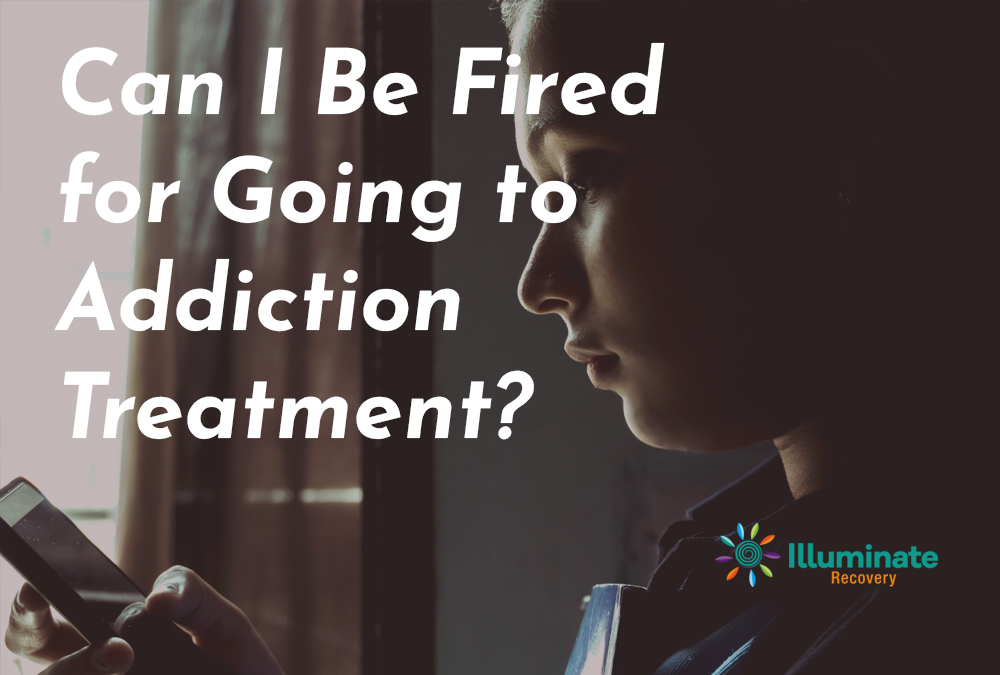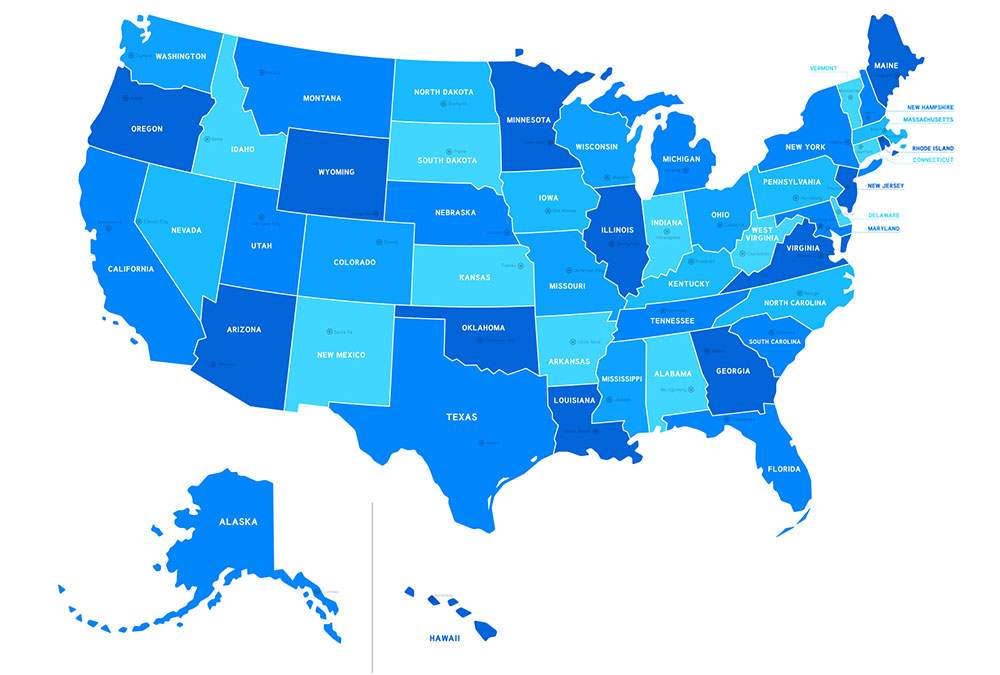
Will I Lose My Job if I Go to Rehab?
Photo From gettyimages
Originally Posted On: https://illuminaterecovery.com/blog/will-i-lose-my-job-if-i-go-to-rehab
Most people who experience a substance use disorder are functional enough to keep a job. The Substance Abuse and Mental Health Services Administration states that 70% of people using illicit drugs are employed full or part time. If you are experiencing a substance use disorder and want help, you may be wondering, “Will I lose my job if I go to rehab?” While this is a valid concern, several pieces of legislation help protect the livelihoods of those seeking treatment for medical conditions like substance use disorders. The American With Disabilities Act (ADA), Family Medical Leave Act (FMLA), and the Affordable Care Act (ACA) work together to protect individuals who wish to seek treatment while remaining actively employed.
Can I Be Fired for Going to Addiction Treatment?
The commitment to treatment is an essential first step in your recovery, and you shouldn’t have to worry about losing your job to seek treatment. What’s more, continued substance use could cause you to lose your job anyway, especially if you show up at work intoxicated. Fortunately, the law can protect your job if you decide to seek treatment. FMLA offers protection against job termination when you choose to seek treatment.
In some cases, a person can face job termination for going to rehab, but not if they opt to use FMLA. According to the U.S. Department of Labor, if an employer has a pre-existing policy that is applied in a non-discriminatory manner, then an employee can be fired for substance use and an employee may be terminated for violating that policy, whether they take FMLA leave or not.
For information on The Best Intensive Outpatient Treatment Program in Arizona please click the link.
Keeping Your Job While in Rehab

The Family Medical Leave Act provides you with protection when you take a leave of absence for medical reasons and provides up to 12 weeks of unpaid time off annually without the risk of job termination. What’s more, FMLA requires that your employer maintain your existing group benefits throughout your leave. Since a substance use disorder is a qualifying medical condition, by law your employer must keep your job available to you when you take FMLA.
Do I Qualify for FMLA?
The Family Medical Leave Act applies to all public agencies and businesses that employ 50 or more workers. Employees may use FMLA if they have experienced one of the following life events:
- The birth of a child, adoption of a child from foster care, or initial fostering of a child from state care.
- An immediate family member requires care for a serious medical condition.
- You require treatment for a serious medical condition.
Also, you are eligible for FMLA if you have worked for your employer for at least 12 months (totaling 1,250 hours in those 12 months) and your employer has at least 50 employees within a 75-mile radius.
Can my Employer Disclose that I have a Substance Abuse Problem to Others at my Work?
Many people believe that if, they tell their employer that they are struggling with drugs or alcohol that it will cost them their reputation. Fortunately, your private medical information is protected by the law. This means your employer cannot share the reason you need to use a FMLA leave.
There is no instance where your boss or HR department can legally share your private medical needs and, if they did, you would be entitled to damages.
FMLA Arizona for Addiction Treatment

FMLA is a federal law, which means it applies in all 50 states, including Arizona. If you plan on using FMLA, Arizona stipulates the following points to keep in mind:
- FMLA is unpaid leave. As such, it does not protect your pay while you are on leave. The FMLA’s intent is to ensure that you have a job to come back to when you complete treatment. Your employer may have more comprehensive coverage available for substance use treatment; check with your human resources department for more details.
- If you intend to use FMLA to seek treatment for a substance use disorder, it is essential to give your employer prior notification. If you fail to notify your employer, you could lose your protection under FMLA and face possible termination. Give your employer as much notification as possible.
- The National Institute on Drug Abuse states that addiction is a complicated medical condition that affects an individual physically, emotionally, and mentally. As such, rehabilitation requires multifaceted, intensive treatment. FMLA covers all qualifying individuals seeking addiction treatment, whether the treatment is inpatient or intensive outpatient therapy.
What If I Don’t Qualify for FMLA?
There are a few reasons why you might not qualify for protection under FMLA. For example, perhaps you work for a company with fewer than 50 employees, or maybe your business operates virtually, and your business does not have its employees within a 65-mile radius. If you are an independent contractor or do not log at least 1,250 hours per year, you might not qualify for FMLA. If these conditions apply, you have a couple of options:
- Check with your company’s HR department. There is a chance that your company has another policy in place for those seeking treatment for substance use.
- Your job may still be protected under other federal legislation, such as the ADA or Mental Health Parity and Addictions Equity Act (MHPAEA).
American With Disabilities Act
The ADA is a landmark legislation passed to protect all persons with disabilities, including those individuals who struggle with debilitating substance use disorders. The ADA applies to all businesses that employ 15 workers or more. The ADA does not protect your job if you use substances at work or if substance use negatively impacts your job performance. But it will offer protection if (a) you are currently enrolled in a substance use treatment program, and (b) you are not using substances or alcohol. When you are not currently using substances, you are entitled to “reasonable accommodations” under the ADA. Examples of reasonable accommodations may include adjustments in the work schedule to attend intensive outpatient therapy or even a temporary leave of absence for inpatient treatment. However, to enjoy protection under the ADA, you must be the one to initiate the conversation about your substance use disorder with your employer.
Mental Health Parity and Addictions Equity Act
Under the MHPAEA, mental health and substance use disorder treatment must be addressed in the same manner as physical health treatments. As such, your employer’s health benefits must offer coverage for addiction treatment in the same way they would for high blood pressure or obesity. Additionally, the Affordable Care Act stipulates that substance use treatment should be one of the 10 essential health benefits under employer-sponsored plans. As such, if you are on an employer-sponsored health plan, you should have coverage for substance use treatment.
Finding Help for Substance Use Disorders

Several federal laws offer protections to workers seeking treatment for substance abuse. FMLA helps protect your job if you must take a leave of absence for treatment. Even if you do not qualify for FMLA, additional remedies may be available under the ADA. No matter which avenue you choose, remember that you are responsible for notifying your employer if you want to enjoy the law’s protection.
If you’re needing any help or information give our drug rehab phoenix center a call. Those first steps toward change are always the toughest part.
